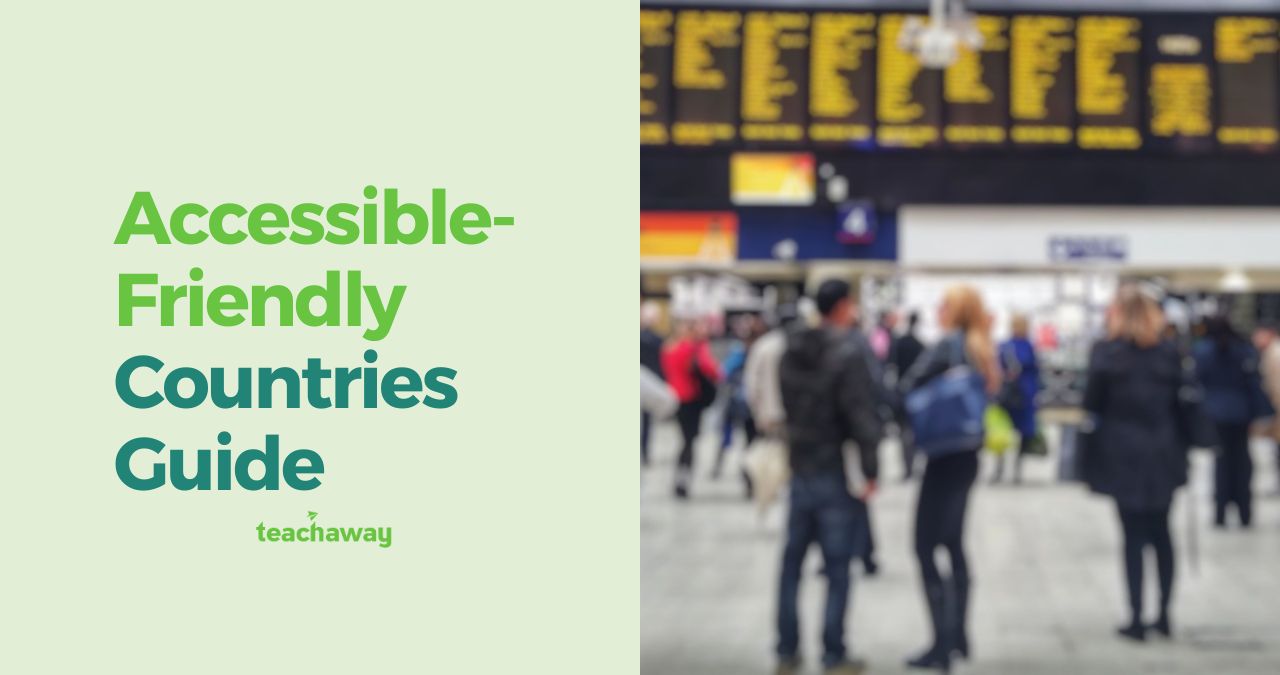Life with a disability can be challenging, but that need not stop you from traveling.
There are many places around the world where people with certain disabilities can find opportunities to teach. These options are limited compared to those for people who have no disabilities, but the opportunity is still there.
Here’s what we’ll cover:
- Different types of accessibility needs
- Traveling with accessibility needs
- Countries with support for disabled people
- Teaching at a school for disabled people
- Assessing life as a disabled person in your host country
Different Types of Accessibility Needs
People with disabilities vary quite widely in their accessibility needs. This means that the places most accessible to one person may not be accessible at all to someone with other needs.
Some of the most common types of disabilities include:
Motor impairment, such as difficulty walking. Many countries have far-reaching wheelchair friendly infrastructure, while others do not.
Visual impairment, which can range from partial to total blindness. Accessibility support includes signs with braille and talking pedestrian traffic lights.
Auditory impairment, ranging from partial to total deafness. Accessibility support includes sign language translators and subtitled videos.
Neurological disabilities, such as epilepsy and cerebral palsy. Accessibility needs vary depending on the condition.
In addition to a divide between countries, there also tends to be a divide within countries between rural and urban areas.
Wealthier and more densely populated cities often have more disabled people and more services for disabled people. Poorer and more sparsely populated areas often have fewer services.
Traveling with Accessibility Needs
Making sure you can travel is the first step towards teaching abroad. If you can’t get there, it doesn’t matter what kind of schools they have!
There are many concerns that people with disabilities have with traveling. This includes traveling to the airport, during check-in, during the flight, and after arriving in a new country.
Confirm with your airline about any accessibility services you may require. They may have rules to follow on your end, such as arriving early for wheelchair service.
Consider any security concerns involved with traveling. If you are in a wheelchair, that is a large metal device that needs to make it through security with you. There may be an option for using a private screening room to go through security.
Inquire about traveling with any medication you may have, and whether or not it will be available in your destination country.
If you travel with a service animal, like a seeing eye dog, you should look into requirements at the airport for that as well.
Countries with Strong Support for People with Disabilities
Although accessibility programs vary widely from country to country, and from disability to disability, wealthy countries tend to have more support for people with disabilities of all kinds. This is because of both more money available for support as well as more awareness of disabilities in general.
Having a disability is still stigmatized in many parts of the world. In places like China or India, disabled people may have severely restricted lives, and spend most of their time at home with family.
The European Union has robust accessibility laws that extend all the way from physical support into cyberspace. The recent European Accessibility Act requires even e-commerce sites to have support for disabilities, such as images that are properly tagged for voice interaction.
Berlin in particular is becoming known as one of the most disability-friendly cities in the world.
The United States of America has had wide-reaching accessibility standards since the Americans with Disabilities Act of 1990 (ADA). The ADA requires employers to provide reasonable accommodations to employees, as well as public spaces to be handicapped accessible.
Australia also has strong support for the disabled. Almost one-fifth of the country’s population lives with disability. Several pieces of legislation exist to help them.
A modern and hi-tech city, Dubai has ample support in terms of transportation and education. The city government uses the term “People of Determination” to refer to people who have disabilities.
Japan has a growing amount of accessibility options, largely due to their high tech cities and large population of elderly people.
For similar reasons, South Korea also has growing wheelchair services, especially in its capital Seoul.
Teaching at a School for Persons with Disabilities
Many schools cater specifically to students with specific disabilities. These may be some of the best places to use your talents.
Since the school is set up for people with your disability, it should have the right kind of accessibility support. And your position as a teacher will serve as a positive role model for your students.
The main opportunities here are schools for the deaf and schools for the blind. There are many such schools around the world, such as Perkins and Overbrook. Additionally, here is a list of schools specifically for the deaf.
Sometimes, schools that serve people with disabilities are classed under a broader heading of “Special Needs”. Many schools on this list, for example, serve the deaf or the blind.
Assessing Life as a Disabled Person in a Foreign Country
There are several points to consider when looking at a new country.
Transportation and infrastructure are crucial for most people who have accessibility needs. You may need wheelchair options, alternative communication methods, and more.
It’s not necessarily the case that you will be able to get in any street taxi. Look for specific accessibility options with public mass transit, such as bus and trams.
Cultural attitudes are subtle but far-reaching, and can have a huge impact on your experience. Unfortunately, there are many places in the world where having a disability is still stigmatized.
Healthcare and health insurance are crucial for ensuring that your needs are met. Look into what kind of health programs will be available, especially if you need a specific kind of medication or treatment on an ongoing basis.
Visas, work permits, and other documentation will vary from country to country. Ask any school you interview with about any restrictions that there may be.
Finally, consider what sort of support systems may be available in your host country. Where there are other disabled people, you can connect with them, and share your experience.
Conclusion: Finding a teaching job with a disability
Teaching abroad is an opportunity that is open to people of all types of backgrounds.
As with many things in life, finding a suitable foreign teaching job is often more difficult for people who have disabilities. But that need not stop anyone from trying- suitable positions do exist.
If you have some sort of motor, sensory, or neurological disability, your first step should be to identify your core needs. These are the services you absolutely must have in moving to a foreign country.
The next step is to assess which countries are likely to support you. As the list above showed, wealthier countries are more likely to have the needed support, but there are other options.
From there, you can search within those countries for plausible schools to apply to. Some of the best options are schools that serve disabled students, such as schools for the blind or for the deaf.
Interested in learning more about teaching English abroad? Teach Away has plenty of information, guides, and networking opportunities.



